Victoria records 18,167 Covid cases, 20 deaths`
Processing delays continue to plague Victoria’s Covid testing, with about 1700 people who were swabbed at Austin Health told their PCR tests are now invalid.
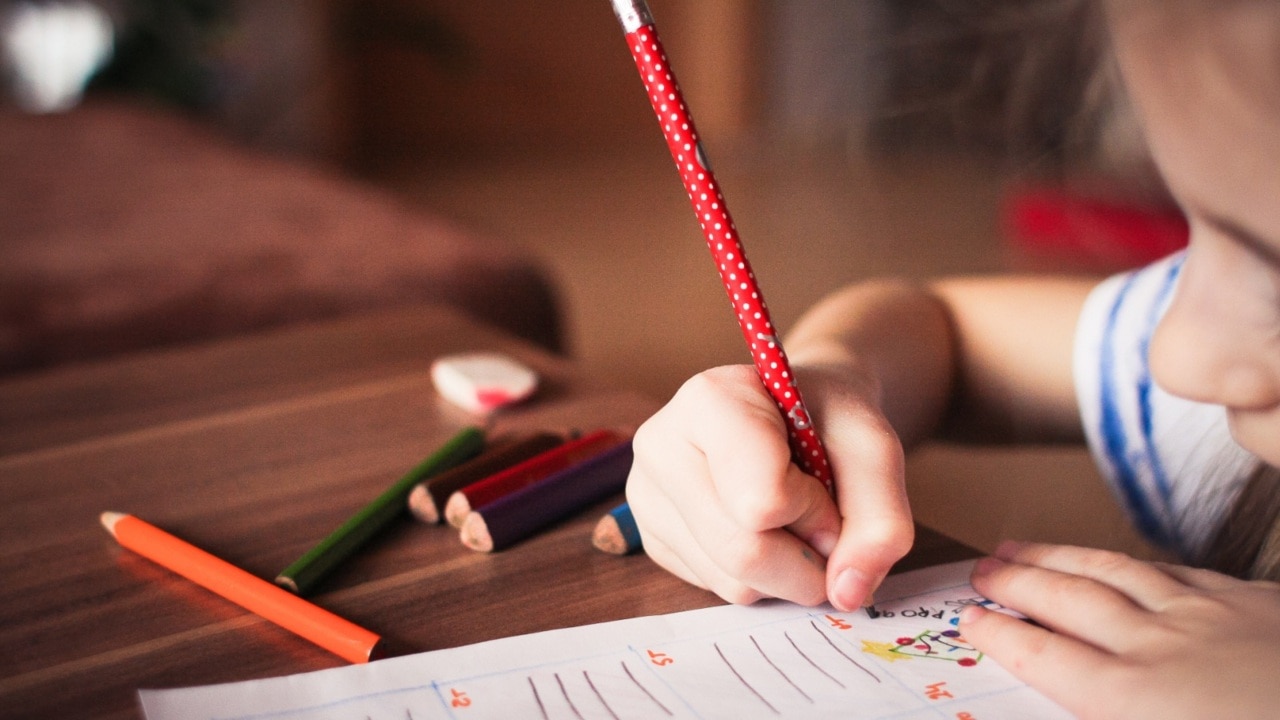
Coronavirus
Don't miss out on the headlines from Coronavirus. Followed categories will be added to My News.
• This coronavirus article is unlocked and free to read in the interest of community health and safety. Tap here to see the latest great value offer for full digital access to trusted news from the Herald Sun and Leader.
Delays processing PCR tests continue to plague Victoria’s health system with hundreds of people told their tests won’t be processed.
About 1700 people who were tested at Austin Health last week have been told their samples are now not suitable for processing because they are more than seven days old.
Those affected have been asked to take another PCR test or a Rapid Antigen test.
People affected will be advised by text message that their test cannot be processed.
“If you were tested due to having symptoms of Covid-19, you should assume that you have Covid-19,” a text from Austin Health read.
“If you were tested because you had been exposed to somebody with Covid-19 or have subsequently been exposed to somebody with Covid-19 you must comply with testing requirements.”
A Department of Health spokesman said the delay was caused by high demand for PCR tests.
“We understand and appreciate the frustration this may cause – people affected are advised to take a Rapid Antigen Test if they have symptoms or have otherwise been directed or recommended to undertake a test,” he said.
It comes after almost 100,000 Victorians were last week told their tests would not be processed.
WORKERS PAID TO GET BOOSTER JABS
Public sector workers, including teachers, paramedics and police officers, will receive up to half a day’s paid time off so they can get their Covid-19 booster, the state government has announced.
The payment will also apply to part-time and long-term casual staff at government departments and administrative offices, statutory authorities, public schools, TAFEs, emergency services, water and land management and other public entities.
Victoria Treasurer Tim Pallas said he “strongly encouraged” all Victorian employers, including the private sector, to put in place similar arrangements to ensure workers were supported in accessing their third dose.
“We recognise as an employer we have a duty of care to our public service,” he said.
The Treasurer said he wanted the private sector to “do the right thing” by matching the state government’s effort.
More than 300,000 public sector workers will be given time off to receive the jab.
SURGE IN KIDS GETTING JAB
Chief health officer Brett Sutton said one in four children aged 5-11 have had one dose of the vaccine which would rise to one in three next week.
“In just ten days that’s nothing short of incredible,” he said.
Prof Sutton reminded unvaccinated Victorians who were hesitant about getting the jab they would not be judged for coming forward.
“We’re here to support you to get vaccinated. You will not be judged for reluctance about vaccination in the past,” he said.
“We will be delighted to see you, we are delighted to support you.”
Mr Pallas flagged Victoria may be past its Covid peak with only 10,023 people returning positive results from more than 43,000 PCR tests conducted on Thursday.
“It’s something like a two-week period since we’ve had numbers as low as this,” he said.
“Things are hopefully demonstrating that we’re getting beyond the peak.”
However, the Treasurer stressed significant challenges still lay ahead.
“I have to make the point that it isn’t over simply because we wish it to be and the threat is real and it is apparent,” he said.
Mr Pallas said the Omicron wave was costing the Victorian economy $30 million a week compared to $800m a week during the Delta wave last year.
Victoria has recorded 18,167 new cases and 20 Covid deaths on Friday.
There are 1096 infected people in Victorian hospitals, with 121 in intensive care and 34 on ventilators.
Of the new cases, 8144 were detected by rapid antigen test and 10,023 were PCR test cases.
GOVT RULES OUT REMOTE LEARNING
Classmates of students who contract Covid when school returns will not be required to isolate in a bid to ensure kids avoid another stop-start year of education.
The federal government has agreed to cover half the cost of a Covid surveillance testing regime of students and staff, which is set to be unveiled by Victoria as early as Friday.
A national cabinet meeting on Thursday failed to lock in consistent protocols for kids to return to the classroom at the start of term one.
But Scott Morrison said all leaders were committed to schools staying safely open, with Victoria’s plan also expected to include mask mandates and widespread use of air purifiers.
The Prime Minister said that while the national medical expert panel did not recommend surveillance testing in schools, the commonwealth would enter into a 50-50 funding split with states that chose to provide rapid tests to students and teachers.
The Herald Sun revealed on Wednesday that Victoria was planning to encourage all students to complete two rapid tests every week.
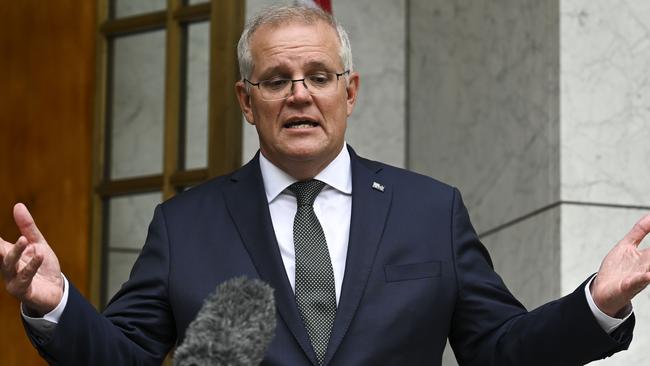
Federal chief medical officer Professor Paul Kelly said such a regime was more about “giving confidence to get kids back to school and teachers into the classroom”.
As part of back-to-school planning, he confirmed close contact rules would remain the same for children in classrooms as for other members of the community, meaning only those who contract the virus or live in the same household must isolate for seven days.
“If you are sick yourself as a child, you should not be coming to school. Otherwise, its schools are opening on time, staying open as much as possible, minimising that disruption to face-to-face learning,” Prof Kelly said.
State governments will be required to source adequate supplies of rapid tests if they choose to implement surveillance testing in schools.
Mr Morrison said this would be part of the calculation for states to decide how long such testing of children was necessary.
“They have full visibility on their supplies and they’ll make decisions based on that knowledge,” he said.
Prof Kelly said the start of the school year would lead to increased transmission of the virus, although he said modelling had not been completed to assess the impact on case numbers.
But he said the national medical expert panel had agreed that “the most important thing is to get schools back” for physical, mental, social and developmental reasons.
Prof Kelly said the incidence of severe disease was “very, very low” among children.
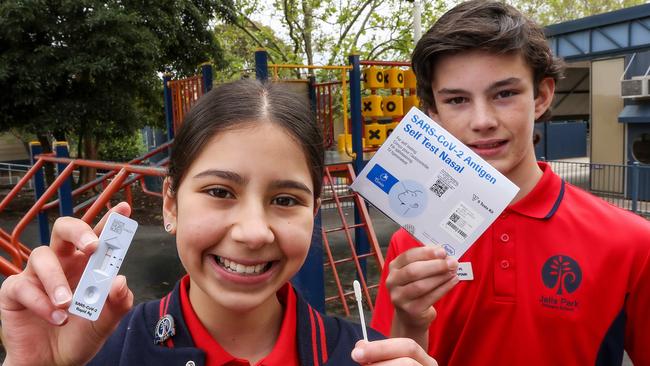
PREMIER RULES OUT REMOTE LEARNING
Daniel Andrews said the government was committed to having every student back in the classroom on the first day of term 1.
The Premier also ruled out a return to remote learning, and said Victorian school settings would align closely with those in NSW.
“We’re not going to build two systems. We’re focused on having our system as we knew it pre-pandemic,” he said.
“It may look different, it will be under a bit of strain because, of course, teachers are not immune from this virus.”
“The main aim here is to have our kids back in the classroom as safe as we can on day one and then we will manage those risks as best we can as we go forward.”
Mr Andrews said students who contracted the virus would need to stay home, but suggested classes would otherwise continue as normal.
“Kids have had two very challenging years. It’s now time to get the kids back into the classroom,” he said.
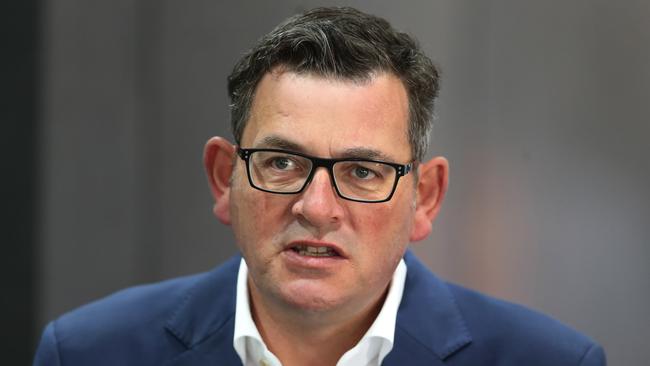
Mr Morrison said the national cabinet had sought further advice from the medical expert panel about whether the isolation period for positive cases could be reduced to five days. They agreed the “settings are right at seven days”, with the issue to remain under constant review.
The Prime Minister also rejected a push from the retail and hospitality sectors to allow asymptomatic household contacts to skip isolation requirements and return to work, as other essential workers have been allowed to do.
Australian Retailers Association chief Paul Zahra said 70 per cent of his members currently had staff in isolation and one in five had to close some stores due to staff shortages.
Restaurant and Catering Australia boss Wes Lambert said the situation was worse than lockdowns imposed over the past two years.
But Mr Morrison said allowing more asymptomatic contacts to avoid isolation risked further transmission of the virus that would increase the pressure on the health system.
“You’ve got to be careful what you wish for,” he said.
LOCALLY MADE RATS ON THE CARDS
Local manufacturing of rapid antigen tests could soon begin with Premier Daniel Andrews flagging an imminent announcement.
Mr Andrews announced a further 166 million RATs had been ordered by the state government on Thursday, in addition to 44 million RATs that began arriving in Victoria this week. “It is very important that we keep adding to that stockpile,” he said. “They are going to be relevant, they are going to be particularly important in the weeks and months to come.
“We have already distributed a lot, more than 2.2 million rapid tests to help workers, staff in sensitive settings and also vulnerable communities.”
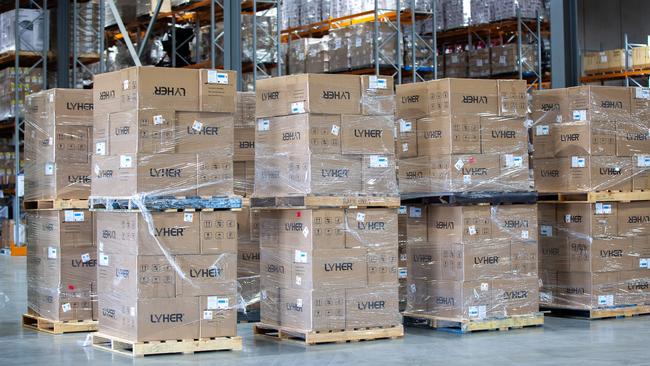
The Premier said the RATs, which would cost in the “hundreds” of millions of dollars, would be enough for several months but more would be needed. So far just 4.5 million of the initial 44 million order have arrived.
But Mr Andrews said it was hoped local manufacturing would soon begin.
“We’re working on whether we can manufacture them and boost some of the local manufacturing that’s already occurring,” he said.
“We’re very deeply engaged with a couple of different companies and we’ll have, hopefully, some very exciting news about that as well.’’
Opposition Leader Matthew Guy said the RAT order was too little too late, and criticised the government’s ongoing pandemic preparation as “woeful”. “Victorians deserve better. While the rapid tests are welcome, they are months too late,” Mr Guy said.
“Just like they were too late when they were first discussed in August last year.
“The Premier should have ordered these tests in August last year. We needed rapid tests months ago.”


